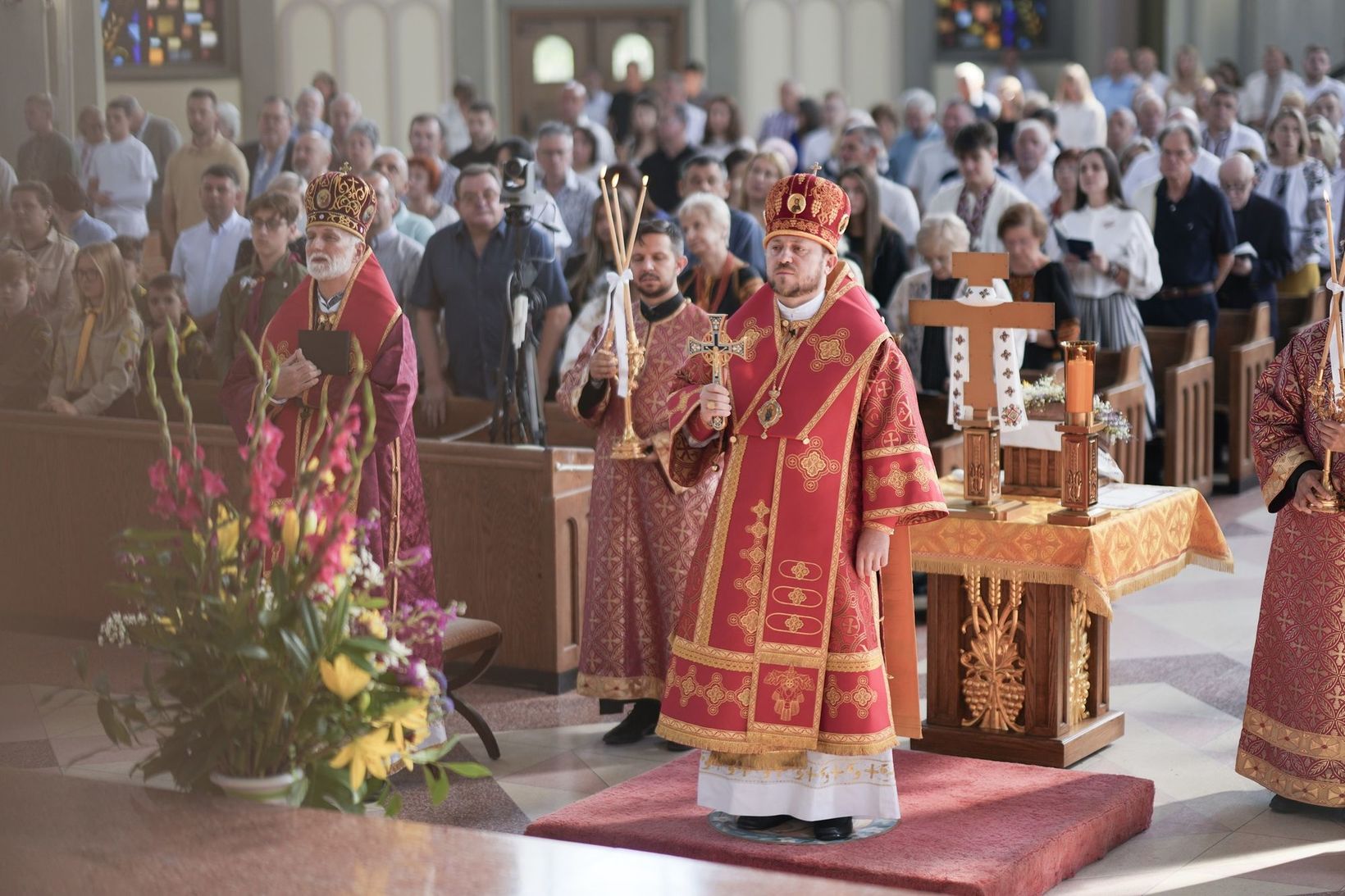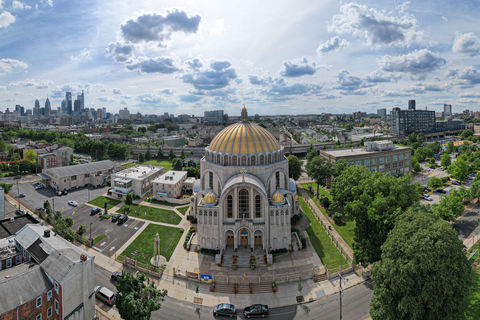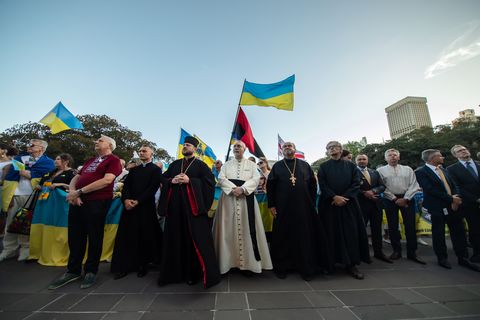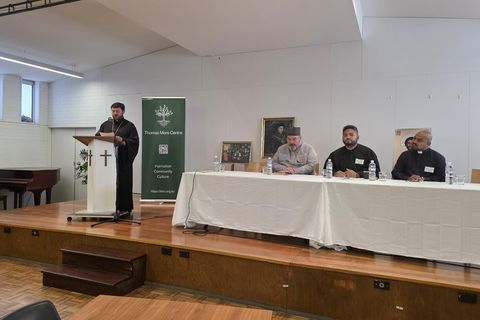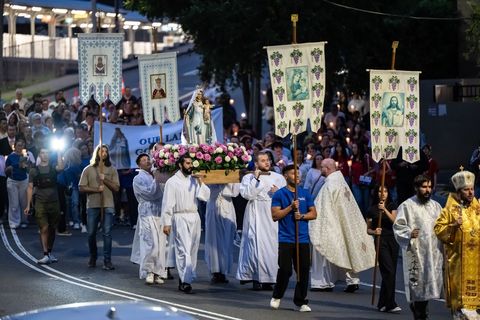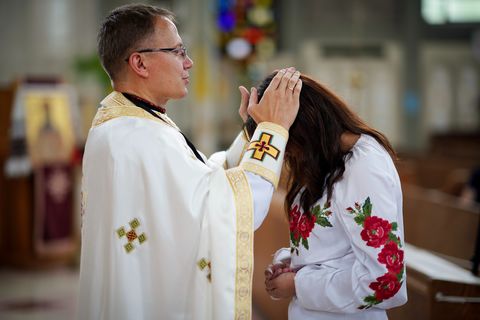Cardinal Mykola Bychok: We must do everything possible on our part, and what is lacking — the Lord will provide
Cardinal Mykola Bychok, who has been the bishop for Ukrainian Catholics in Australia, New Zealand, and Oceania for over five years, recently visited Philadelphia. The Archeparchy is not unfamiliar to him — he previously served for five years as a parochial vicar in Newark.
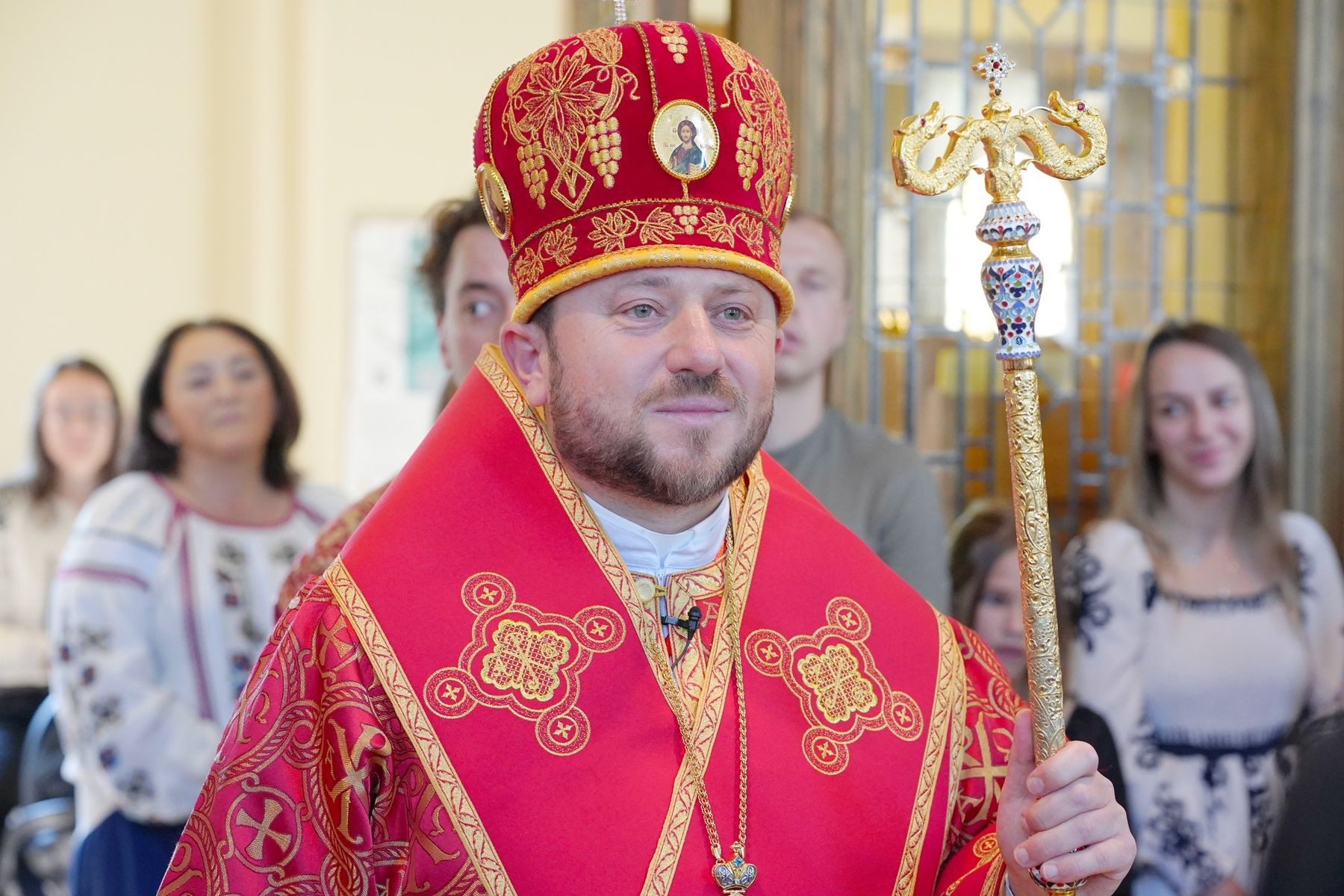
In conversation with us, the Cardinal spoke about how he combines the role of shepherd for communities scattered across an entire continent with numerous administrative responsibilities, how the pandemic and the war in Ukraine have affected the lives of the faithful and pastoral work, and how being appointed a cardinal brought new challenges and opportunities. He also shared his recipe for how to love a new place and new people, and how, despite distances and difficulties, he tries to remain close to his people.
How have your first five years of pastoral ministry in Australia, New Zealand, and Oceania gone?
These five years have been unique, as they began during the COVID pandemic. It was very difficult to get to Australia. Indeed, it was a challenging period. I had to adjust to my new ministry: yesterday I was a priest, a missionary, a Redemptorist, responsible for a specific parish, knowing my faithful, and suddenly I became a bishop. Now I am responsible not only for the people of one community but for all parishes, for all priests, deacons, and also for the sisters and nuns.
A lot of traveling is required because the faithful are scattered not only across Australia but also across New Zealand and Oceania. I must be close to the people, but at the same time, I must be in the office managing the eparchy. This also includes everyday matters: insurance, legal issues, and administrative details. We do not have a large office or staff. When I arrived, I was effectively working alone full-time. Only twice a week did a secretary-accountant come. Due to the shortage of priests, even the vicar general could not be present in person, as he lived in Sydney. Our vicar for clergy is in Perth, which is four thousand kilometers away.
The situation changed after I was appointed cardinal. I received certain funds, now have a personal assistant, and the vicar general also moved to Melbourne, closer to the cathedral. Thus, a team was formed that helps not only with my mission as cardinal but also with the administration of the eparchy. The workload increased significantly: with the appointment as cardinal, new invitations and responsibilities arose. I need a lot of assistance to properly carry out the mission entrusted to me by the Church.
I am often invited to Roman Catholic structures, conferences, and events. I cannot be everywhere, but I often respond to invitations. For example, I spoke to the Syro-Malabar youth — over 500 people gathered — or gave a talk for Catholic Services of Australia — a very interesting conference. It is an opportunity not only to speak on different topics but also to highlight the situation in Ukraine, particularly the war. It is a challenge, but at the same time, it is an opportunity — to be the voice of our Church in those distant regions, as His Beatitude Sviatoslav rightly noted.
How much time do you spend traveling?
A lot. In the first years, even Google Maps sent me statistics showing that I had circled the Earth one and a half or two times. Over the past year, I have flown more than 100,000 kilometers, even more. Just the trip to Europe and back — that is already 32–33 thousand kilometers. And if I add flights and trips within Australia, it becomes a huge amount.
In the first months of the pandemic, I hardly moved, as it was prohibited to go more than five kilometers from my place of residence. But since January 2022, I began visiting our parishes. During the year, I was able to visit all the communities: we have 10 parishes and 11 missions. This means that every two weeks I had to set out on the road. Traveling was not only within Australia but also to New Zealand. Visits there last for weeks: 10 days on the North Island, then on the South Island. This is real missionary work: sometimes I arrive not for a grand meeting with ceremonial bread, but simply as a priest serving the people, even if there are only a few of them.
After being appointed cardinal, my schedule changed: I still visit communities, but I also have to spend more time in the office. My main vocation is to be a bishop for Ukrainians in Australia, New Zealand, and Oceania. The cardinal’s mission is additional.
And what are the faithful in Australia, New Zealand, Oceania, Tasmania like? How would you describe them?
Currently, about 52,000 people in Australia identify themselves as Ukrainians. Between 7,000 and 10,000 belong to our Church. As everywhere, there are more people in churches at Christmas and Easter, and fewer on an ordinary Sunday.
Most of our people arrived in the 1950s, after the Second World War. Some emigrated to America or South America, some — to Australia or New Zealand. About 20,000 Ukrainians arrived then. In the 1970s, there was a small wave, a bit more in the 1990s during the war in Yugoslavia. Ukrainian Bosnians arrived then. In our cathedral, about 40 % of the faithful are precisely them. This is an interesting group of people. In the 19th century, they were relocated to Bosnia, promised land, but there were only stones. Metropolitan Andriy helped them greatly. They built a church, a school, and a community.
Few Ukrainians arrived during independence: Australia is very far, and its immigration policy is more oriented toward Asia. Therefore, the face of our Church is people 60+, the older generation. Our churches are not crowded; we are more like the early Christians: few in number, but faithful.
Each state has its own community and head, who are part of the Australian Federation of Ukrainian Organisations. It is a separate legal entity representing the interests of Ukrainians and actively working for the good of Ukraine.
During the war, about 15,000 Ukrainians arrived, but half have already returned. Australia provided humanitarian visas for three years, with permission to work and medical coverage. Many have already obtained permanent resident status. This is about 5,000 people.
We have Ukrainian Youth Association (SUM) and Plast branches. I try to visit their camps. When the northern hemisphere has winter, we have summer. So after Christmas, the camps begin. I go for a few days to the SUM members, a few days to the Plast members. There, I meet the youth, celebrate the Liturgy, and hold spiritual conversations in nature, where kangaroos run and parrots fly.
Currently, all our parishes have priests, except New Zealand, where there are about 2,000 faithful. They are visited several times a year by priests from Melbourne. During the war, I ordained three priests, so in total, we now have four new pastors.
You mentioned the pain of war. How do you experience it being so far away?
The first months were very difficult. I could not sleep and had health problems. Even Roman Catholic bishops came up and said, “Something is wrong with you, you need to take care of yourself.”
My situation is unique: I am the only Ukrainian Catholic bishop on the entire continent. In Ukraine, Europe, or America, there are metropolitans, several bishops, and I am here alone. Therefore, I try to maintain contact with Roman Catholic bishops and other Eastern bishops: Syro-Malabars, Maronites, Chaldeans, Melkites. This brotherly support helped greatly.
The war hurts not only Ukraine. Many Australians also cannot understand how such evil is possible in the 21 st century. The whole world sees who the aggressor is and who the victim is, but often remains silent.
Australia, thank God, provides comprehensive support. It is one of the leaders outside NATO in helping Ukraine. Although there are few of us, the community is very active. There is the Future Ukraine Fund, which collaborates with Caritas.
Our newly arrived Ukrainians often feel guilty for leaving their homeland. I remind them that they are not traitors if they help: representing Ukraine’s interests is already meaningful work — even through small actions, such as informing neighbors about what is happening, volunteering, or simply praying.
Each of us must contribute our piece to this mosaic, and this becomes our great victory. In Australia, we represent Ukraine’s interests, promote our culture, faith, and tradition. Our people have great heritage and a millennia-long history. Once the world did not know where Ukraine was; now, even through terrible circumstances, everyone understands that it is not Russia and not part of it. Today there is clarity about what Ukraine is, and many people admire our strength of spirit.
Kyiv residents show how it is possible to remain productive even when every day they have to go to the shelter, sleep little, and face danger. But God gives them strength and hope, and our people understand: we must fight, we cannot give up. And since we want to live, work must be done not only by those in Ukraine but by all Ukrainians around the world.
You often changed your place of service: Prokopievsk (Russia), Ivano-Frankivsk, Lviv, America… How do you fall in love with a new place and new people? Is there a recipe?
My recipe is very simple: accept the reality that where I am is my home. Sometimes this is not easy. I think that on the first moves from one place to another, one still feels strangeness, discomfort, uncertainty. But over time, having some background and experience, I begin to understand that where I am is my place. Yes, I was born in Ternopil, but in 1997 I left and have already lived 28 years outside Ternopil. I have spent most of my life in other cities, other countries.
For me now, my home is the city of Melbourne. When I return there, I return home. Here I already have friends. I understand that the Lord sent me here, and I must fulfill this mission as best as I can here, in Melbourne, in our cathedral, for Ukrainians in Australia, New Zealand, and Oceania.
Also, one has be as busy as possible. But at the same time, from time to time, one needs to find a moment for rest — this is my advice, first of all, to myself. I try to follow this.
My new ministry (being a cardinal) has changed a lot in my life; it affects not only me but also the people around — the staff, our priests. I must be accessible. Every priest has my phone number and can call or meet at any time; even the faithful can do this.
I must be simple, open, and understand that this is exactly the place of my service, to which the Lord has called me. I gave my consent — and now I must move forward at full speed, without looking back, so as not to become like Lot’s wife, a pillar of salt.
I move forward, realizing that I am not alone.
I truly feel this support. For over five years I have been a bishop in Australia, New Zealand, and Oceania. Soon it will be the anniversary of when the Pope made me a cardinal. God is at work in this. Sometimes I cannot explain how. But that does not mean I can do nothing. I must do everything possible on my part, and what is lacking — the Lord will provide.
By Mariana Karapinkaukrcatholic.org
